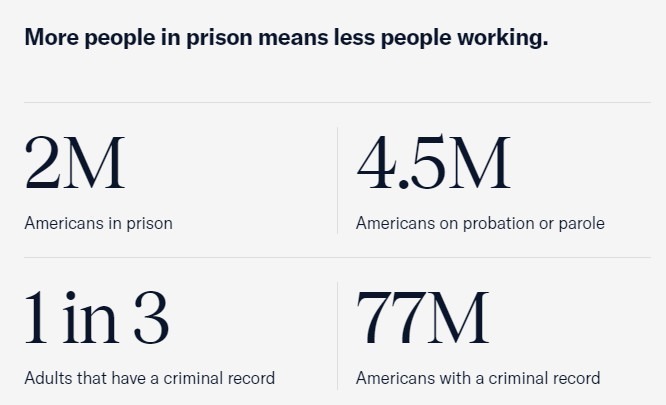Second-chance hiring refers to a growing trend among employers to hire people with criminal records—offering them a “second chance” in the recognition that people change, learn and grow over time and can excel if someone just offers a hand up.
Many employers are doing just that. It’s a source of applicants that is often overlooked but that may represent value to employers in an increasingly tight labor market.
As HR Brew reports: “There are nearly 2 million people behind bars in the US and its territories, a March Prison Policy Initiative report found. An additional 70 million civilians with a criminal arrest history live in the US, and 600,000 people are released from prison annually, according to the US Chamber of Commerce.”
Frontier Co-op is just one example of a company that is reaching out to this population and finding these relationships to be a win-win.
A Win-Win Proposition
“Through Frontier Co-op’s Breaking Down Barriers to Employment initiative which helps our employees and community members overcome systemic barriers to employment and economic mobility, we’ve hired more than three dozen justice-involved employees, as well as a number of individuals struggling with homelessness and have seen firsthand the impact second chance hiring practices have had on our business, employees and community,” says Megan Schulte, vice president of human resources.
This doesn’t mean, Schulte says, that they hire everyone who applies regardless of their background. What it does mean is that “we don’t’ screen people out just because of their past.” Their goal, she says, is to “eliminate a bias that could negatively impact good candidates along the hiring journey—because a checked box on a job application shouldn’t be a barrier between a person and their chance to earn a living wage.”
Since the program started in 2017, Schulte says, “more than 20% of our production roles have been hired through our second chance hiring and apprenticeship programs.” For employees this has provided an opportunity to learn new skills, gain experience in the work world, and build “and foster relationships with their supervisors and peers, none of whom need to know anything about the mistakes of their past.”
There are other benefits for employers, as well. For instance, the Work Opportunity Tax Credit (WOTC) is a credit available to employers that hire those who have faced employment barriers.
Best Practices
Not all of those with criminal records will work out, of course. But that’s also true of those without criminal records. Anjela Mangrum, president of Mangrum Career Services says: “Of the three ex-convicts I recruited last year, one turned out to be an excellent choice—a repentant hard worker who wanted to prove himself worthy of a second chance. The second didn’t last for over six months because he wasn’t ready to put in any effort. The third one had some anger issues, so he ended up getting fired after a year at the job.”
These success rates, she says, are only slightly lower than those for regular candidates. “Around 50% of all employees tend to be long-term hires, while 50% leave their companies within the first year.” In addition, she says, those with criminal records who are willing to work hard can offer great value and should be the type of talent employers should seek. “Not only do you get loyal employees who are ready to show gratitude for being given a chance, but you’re also helping society in general by giving an ex-convict a chance to stay away from further criminal activity,” she says.
“From my experience, some green flags while hiring ex-cons include their latest felony being over seven years ago, their voluntarily sharing information about their past, and a crime unrelated to the job role,” Mangrum says. “For instance, while I would think twice before considering hiring someone with embezzlement on their record for a financial role, I would definitely give them a chance for lower-risk positions such as in customer service.”
Mangrum recommends having in-depth conversations with ex-offenders before hiring. “While interviewing, note their soft skills, ask them about their work ethic, what they’ve done since they were charged, and whether they’ve sought professional help or rehabilitation in between.”
As many employers are discovering today second-chance hiring can open up an untapped source of talent that can prove to be conscientious contributors. When appropriately vetted the risks are minimal—the rewards can be significant.
Image Ideas
https://www.uschamber.com/workforce/data-deep-dive-the-workforce-impact-of-second-chance-hiring-3
https://www.irs.gov/businesses/small-businesses-self-employed/work-opportunity-tax-credit#targeted



